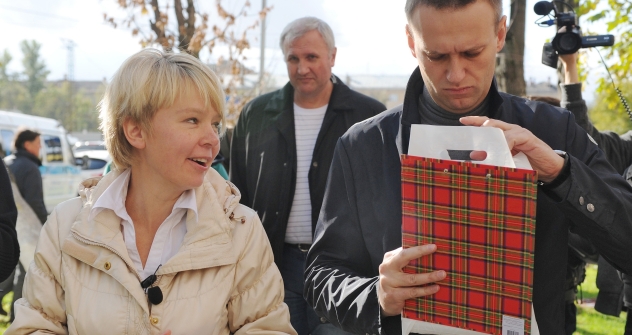
Russia's 2012 regional elections will test the new political system of the country. Pictured: Evgeniya Chirikova, the Khimki mayoral candidate (left), and Russia's anti-corruption campaigner Alexei Navalny (right). Source: Kommersant
Under Russia’s political legislation, there are two times during the year when regional elections may be held, which gives political scientists a chance to assess the changes in the balance of political forces in the country.
The Oct. 14 elections, however, are fundamentally different from all previous ones. The easing of registration procedures for new political parties has dramatically increased the number of players in the political arena: more than 40 political parties of various stripes are battling for seats in legislative assemblies and for mayors' offices.
The main question though, as before, is who will win in each region, the ruling United Russia party, or the opposition.
Khimki
The mayoral election in the town of Khimki has attracted a lot of attention from political pundits for several reasons. First, Khimki is one of the most populous and wealthy towns in the Moscow Region.
Secondly, the town has been in the media spotlight recently due to outrage over the construction of a new express highway between Moscow and St. Petersburg. Residents took to the street to protest the project and some of Russia's best-known national activists have taken part in the Movement to Defend the Khimki Forest.
The third factor that puts the Khimki elections in the spotlight are the candidates for mayor.
View Larger Map |
Initially, there were 26 nominees, including some new to politics, such as rock musician Sergei Troitsky (“Spider”).
The main fight was expected between the current Mayor Oleg Shakhov and two environmentalists, Oleg Mitvol and Evgeniya Chirikova.
Most expect Shakhov, the United Russia candidate, to win .
“He is an official candidate backed by United Russia, although, officially, he is registered as self-nominated. If the situation will be stable and there will be not any split within the local administration, United Russia’s electorate and the administrative resource should bring about Shakhov’s victory,” said political analyst Pavel Svyatenkov.
Opinion polls back Svyatenkov's prediction: According to the All-Russia’s Public Opinion Center (VTsIOM), a week before the election, 41 percent said they would vote for Shakhov, 16 percent for Chirikova and 18 percent for Mitvol.
Political scientists are watching the Kaliningrad elections closely - and not only because Russia’s western exclave traditionally supports opposition sentiments and is ever ready to protest.
View Larger Map |
Whoever becomes the city’s mayor for the next five years will face the challenge of utilizing the multi-billion investments in the preparation for the FIFA 2018 World Cup.
The two main candidates for mayor are Alexander Yaroshuk of United Russia and the sole opposition candidate, Yury Galanin, of the Communist Party.
Local experts have not dared to predict the outcome, remembering United Russia’s dismal showing in the December 2012 parliamentary elections, when it won just 25 percent of the vote (one of the party’s worst results in the country) to the Communists’ 31 percent. Considering that this year Galanin represents not only the Communists but also the opposition party Just Russia, he may win even more votes.
Yet some experts question Galanin’s chances. One of them is Solomon Ginzburg, a regional Duma deputy who organized mass protests in Kaliningrad.
“None of the opposition members has come up with a relevant program or departed from their parties’ ideological line, whereas the city residents want to see a competent manager as their mayor. Today, Yaroshuk is virtually unchallenged,” Ginzburg said.
Likewise, political analyst Konstantin Kalachev is wary of placing his bets on the opposition.
“The people of Kaliningrad are not enthusiastic about the governing party’s candidates but they see no alternative. Yaroshuk has won even before the vote,” Kalachev said.
Nizhny Tagil
Nizhny Tagil, home of the famous Uralvagonzavod plant, which produces almost all Russian tanks, is known for its loyalty to the president. During the winter opposition protests, the plant’s representatives, led by Igor Kholmanskikh, offered to “bring their guys” to Moscow and “disperse the opposition rallies.”
View Larger Map |
Since then, Nizhny Tagil has had the image of a city that is completely behind the President, and Kholmanskikh has been appointed the President’s Permanent Representative to the region.
The Oct. 14 election will show just how much support Kholmanskikh and his people have in the city. The main contenders will be Sergei Nosov of the United Russia and Andrei Murinovich, an opposition candidate.
Analysts tip the pro-governing party candidate to win. Even so, the head of the Regional Election Committee, Valery Chainikov, does not share this mood.
“You may be sure of the result," he told journalists, "but I am a superstitious man. This time, 12 parties are taking part in the race. I’ll tell you what their results will be on Oct. 15.”
All rights reserved by Rossiyskaya Gazeta.
Subscribe
to our newsletter!
Get the week's best stories straight to your inbox